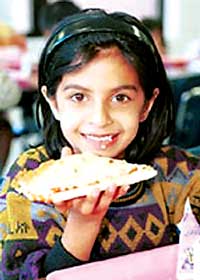 When my daughter Deepti was in grade three eight years ago, she came back from school one day and snapped at me: "I am not going to take roti and alu tarkari for lunch anymore, buy me noodles, or I won't have lunch."
When my daughter Deepti was in grade three eight years ago, she came back from school one day and snapped at me: "I am not going to take roti and alu tarkari for lunch anymore, buy me noodles, or I won't have lunch." My daughter used to enjoy home cooked food, so I was surprised. She told me with tears in her eyes: "They all tease me and laugh at me because I am eating dirty food, and they are all eating chau chau and chips."
Oh, so that was it. I felt bad for her, for myself and for a culture that has turned away from nutritious food to a junk food fad promoted by advertising. Like a lot of mothers, I was tempted to console my daughter and tell her that I would start packing instant noodles into her lunch box from tomorrow. But I took the difficult path. It took a long time to make Deepti understand that it was her friends who were eating junk, that eating wholesome home food was nothing to feel ashamed of.
She agreed to take the rotis, but reluctantly. She still wasn't completely convinced. A week later, she came running up to me after school, beaming: "The teacher inspected our lunch boxes, and she showed mine to the whole class and said Deepti is the only one eating healthy food, and all of you are eating bad food, and she even told them not to bring chau chau to school anymore."
Aside from the fact that in my daughter's young eyes her mother was "cool", this incident tells us something about peer pressure, the power of education and the power of media to influence our eating and other habits.
Alas, Nepal's epidemic of junk food shows no sign of abating. Hospitals in urban Nepal have started reporting malnourished children from middl- and upper-middle class families who are addicted to a diet of junk food. "Many children are malnourished and get sick, the children are not eating traditional nutritious home food because they are hooked to the instant snacks," says Pushpa Raj Sharma, senior pediatrician at the Teaching Hospital in Maharajganj.
In the UK, there is a move to put a statuatory ban on all advertising of fatty, salty, sugary junk food on children's television and over 80 British public health organisations have signed up. Japan already has a lead, and doesn't allow commercial promotion of junk foods in schools with coupons, ads or commercial materials. Snack and soft drink vending machines are not allowed inside schools and students are not allowed to buy and eat food on their way to school and home.
Obesity, malnutrition, cardiovascular diseases and dental caries are referred to as non-communicable diseases, but they are actually communicated through media and through the cultural environment.
As Nepal goes through something of a junk snack boom, it is easy to see why the advertising campaigns work. Gone are the messy preparations of jaulo, bhuteko bhat, roti tarkari, kheer or dahi chiura. Mothers are happy because it doesn't take time to stuff the children's lunch box in the morning. And when they come home from school, it is noodles and chips or biscuits again. Overworked themselves, mothers are glad because they "didn't have to put in more work".
Of course, completely depriving kids of some of these junk foods may force them to go on clandestine binges. The best way is to lay down some moderate house rules and have an honest heart-to-heart talk like I had with Deepti. It works.
Dr Aruna Uprety is a women's health and reproductive rights activist.



